Understanding mental health is the foundation upon which our journey to comprehensive well-being rests. It involves not only acknowledging the importance of mental health but also grasping the intricate dynamics that shape this crucial aspect of our lives. This article on the introduction to the science of mental health starts with the definition.
A. Definition of Mental Health
Mental health is often defined as a state of emotional, psychological, and social well-being in which individuals can effectively cope with life’s challenges.
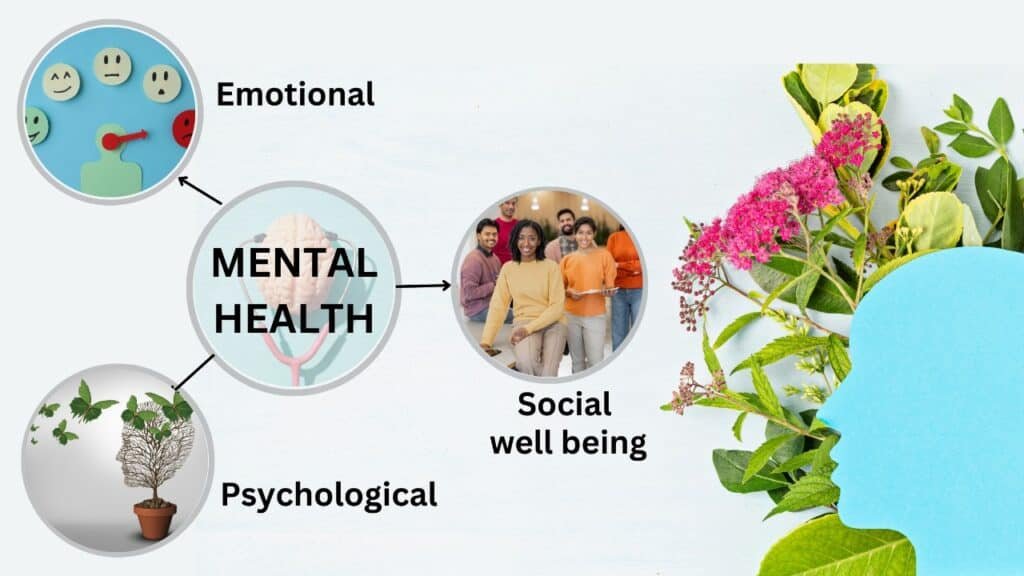
It goes beyond merely being free from mental illness; it encompasses the ability to experience a full range of emotions, build and maintain healthy relationships, and make rational decisions.
This definition underscores that mental health is not a binary state but exists on a spectrum, and it varies from person to person.
Mental health is a dynamic state, ever-changing and influenced by numerous factors. It is not an endpoint but a lifelong journey where individuals strive to find equilibrium, manage stress, and adapt to life’s challenges.
B. The Holistic Nature of Mental Health
Mental health is not an isolated element of well-being but an integral part of one’s overall health. It is a holistic concept that involves three key dimensions:
- Emotional Well-Being: Emotions are a fundamental aspect of human life. Mental health involves recognizing, understanding, and managing emotions effectively.
It’s about experiencing happiness, sadness, anger, and a myriad of other emotions in a balanced way. - Psychological Well-Being: The cognitive aspect of mental health encompasses rational thinking, effective problem-solving, and memory functions.
A healthy mind can think critically, adapt to new information, and maintain clarity in its decision-making. - Social Well-Being: Our relationships and social interactions significantly impact our mental health.
Maintaining healthy relationships, building a support system, and being part of a community are crucial aspects of social well-being.
These dimensions of mental health are interconnected. An emotional disturbance can affect cognitive functioning, and social isolation can lead to emotional distress.
Understanding this interplay is essential for achieving and maintaining good mental health.
A balanced mental health perspective recognizes that challenges are a part of life, and it is normal to face periods of emotional discomfort or distress.
The key is to develop the resilience and coping skills to navigate these challenges effectively, ensuring they do not become debilitating.
In this understanding of mental health, we find the motivation to invest in self-care, seek help when needed, and contribute to the creation of supportive environments that foster well-being for individuals and communities alike.
The Significance of Mental Health
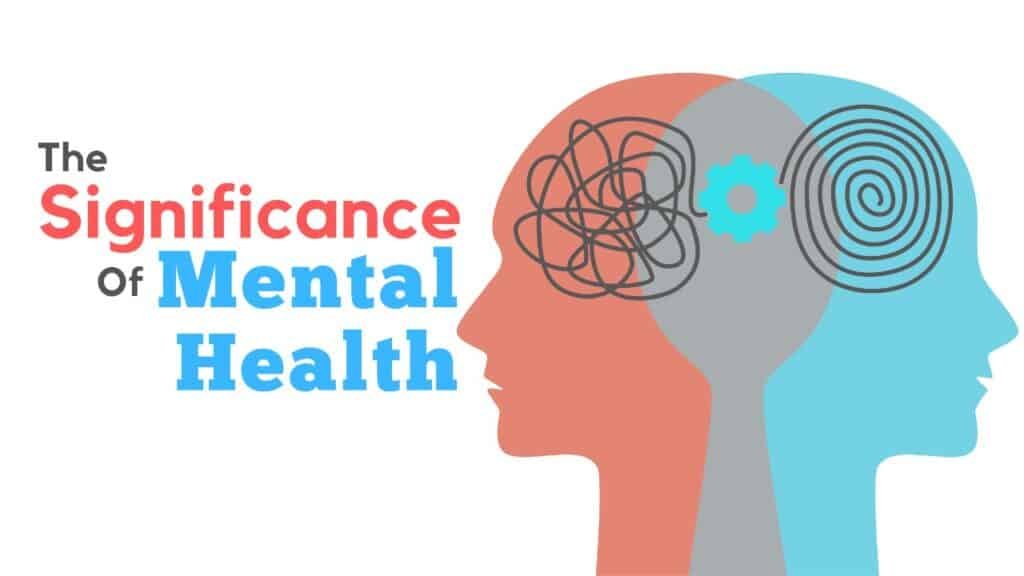
Recognizing the significance of mental health is fundamental to appreciating the role it plays in our lives and in society as a whole.
The implications of mental health extend far beyond individual well-being, influencing various aspects of life and our communities.
A. Impact on Quality of Life
Mental health is intricately linked to the quality of life that an individual experiences. A person with good mental health is more likely to lead a fulfilling and satisfying life.
Here’s how it impacts one’s daily existence:
- Contentment: Good mental health is associated with feelings of contentment, happiness, and satisfaction. It allows individuals to experience a sense of well-being and joy in their daily lives.
- Healthy Relationships: The ability to form and maintain healthy relationships is closely tied to mental health. It enables individuals to connect with others, build supportive networks, and engage in fulfilling social interactions.
- Resilience: Good mental health equips individuals with the resilience and coping skills necessary to navigate life’s challenges. They can adapt to stress, overcome adversity, and maintain emotional equilibrium.
- Productivity: A healthy mind is more productive. It allows individuals to focus, make rational decisions, and perform effectively in their personal and professional lives.
- Personal Growth: Mental health is essential for personal growth and development. It empowers individuals to set and pursue goals, embrace new opportunities, and continue learning and evolving.
B. Societal Implications
Mental health is not solely an individual concern; it also carries significant societal implications that affect the broader community.
Understanding its significance at this level is vital for creating a more supportive and empathetic society:
- Economic Impact: Poor mental health can lead to reduced productivity, absenteeism, and increased healthcare costs for individuals and employers. This, in turn, has economic consequences for societies.
- Social Cohesion: A population with good mental health is more likely to engage in and contribute to community activities, resulting in stronger social cohesion and a sense of togetherness.
- Public Health: Recognizing mental health as an integral part of public health underscores the importance of access to mental healthcare and services, making them more accessible and reducing health disparities.
- Prevention and Early Intervention: By understanding the significance of mental health, societies can place greater emphasis on prevention and early intervention, reducing the burden of severe mental health conditions.
- Reducing Stigma: Acknowledging the importance of mental health is essential in reducing the stigma often associated with mental health challenges. This can create a more inclusive and accepting society.
In conclusion, the significance of mental health is profound and far-reaching. It impacts not only individual well-being but also the overall health and functioning of societies.
Recognizing the value of mental health underscores the importance of addressing and supporting it at both the individual and community levels, ultimately contributing to happier, healthier, and more prosperous societies.
Historical Context
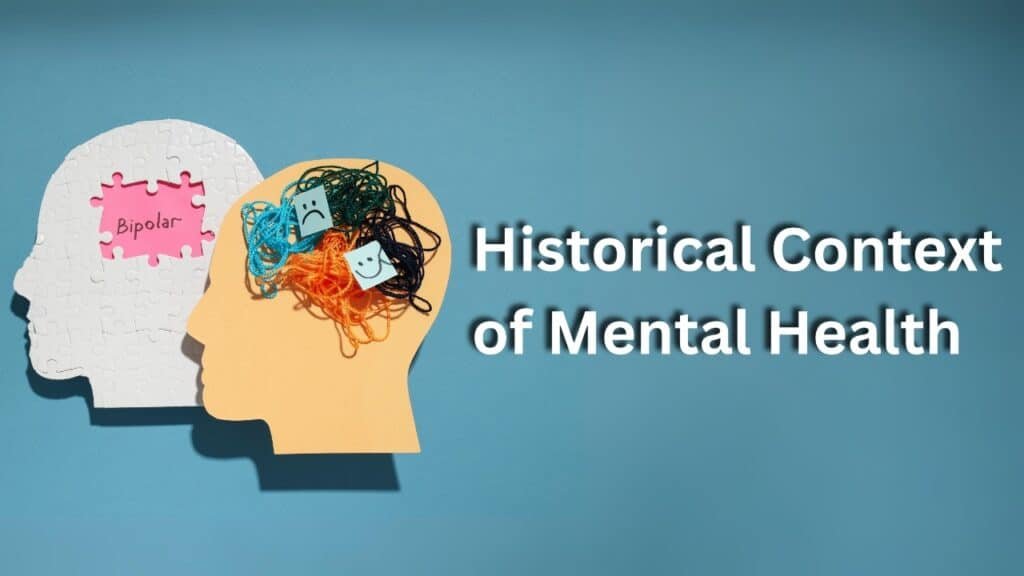
The historical context of mental health provides essential insights into how societies have perceived and treated mental well-being over time. Understanding this history is crucial in recognizing the progress made in the field and the challenges that have been overcome.
A. Evolution of Mental Health Understanding
The history of mental health understanding is a journey from superstition and mysticism to empirical science and evidence-based treatments:
- Ancient Beliefs: Early civilizations often attributed mental illness to supernatural forces. Many cultures believed that mental health challenges were a result of demonic possession or displeasure of gods. Treatments included exorcism and ritualistic practices aimed at driving away evil spirits.
- Moral Treatment Era: The late 18th century saw a shift towards more humane treatment. The “moral treatment” approach emphasized compassionate care and therapy. Pioneers like Philippe Pinel advocated for the humane treatment of individuals with mental disorders, moving them away from chains and dungeons towards therapeutic environments.
- Biological Understanding: The 19th and 20th centuries marked a shift towards understanding mental health from a biological perspective. The emergence of psychiatry and advancements in psychology contributed to a more scientific approach to mental health. Sigmund Freud’s psychoanalysis and Emil Kraepelin’s classification of mental disorders were significant milestones.
- Psychopharmacology: The mid-20th century brought about a major breakthrough with the discovery of psychotropic medications. Drugs like lithium and antidepressants revolutionized the treatment of mental health disorders, offering effective symptom management.
B. Stigma and Awareness
Understanding the historical stigmatization of mental health issues is essential to grasp the progress made in reducing societal prejudices:
- Stigmatization: Mental health issues have long been stigmatized. Historically, individuals with mental disorders were often ostracized, isolated, or confined to asylums.
The stigma associated with mental health challenges made it difficult for affected individuals to seek help or integrate into society. - Advocacy and Awareness: Throughout the 20th and 21st centuries, advocacy groups, mental health professionals, and individuals with lived experiences have worked diligently to reduce stigma and promote awareness.
Initiatives like Mental Health Month and World Mental Health Day have been instrumental in bringing mental health to the forefront of public discourse. - Legal and Ethical Changes: Changing societal attitudes led to significant legal and ethical changes. The deinstitutionalization movement aimed to transition individuals from psychiatric institutions to community-based care, emphasizing a more humane and inclusive approach.
Understanding the historical context of mental health illustrates the progress that has been made in the field, moving from superstition and stigmatization to a more compassionate and evidence-based approach.
This history also underscores the importance of ongoing efforts to reduce stigma, provide access to mental healthcare, and ensure that individuals with mental health challenges are treated with dignity and respect.
The historical context of mental health serves as a reminder of the progress made and the work yet to be done to achieve a society where mental health is valued and supported.
The Science Behind Mental Health
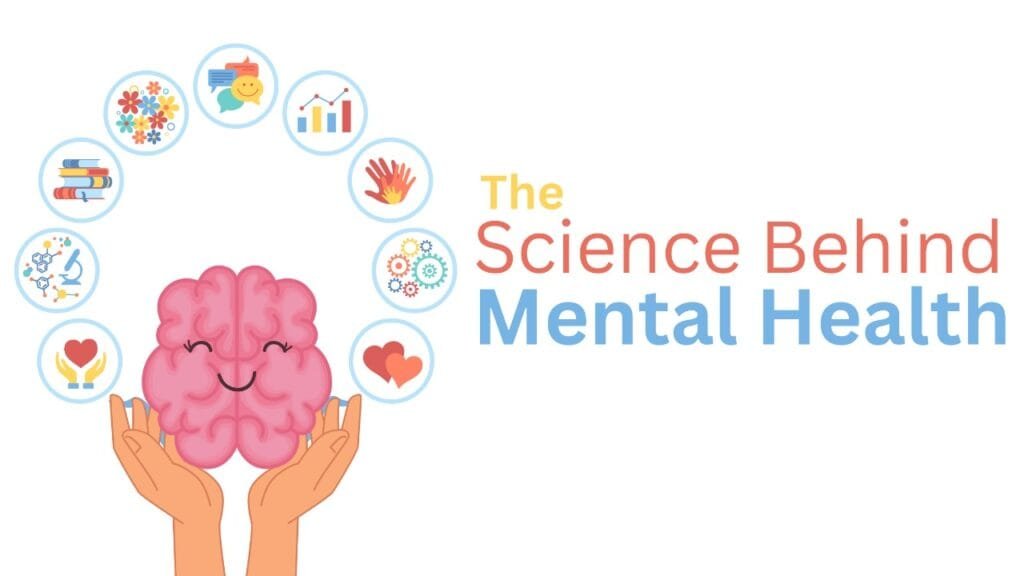
Understanding the science behind mental health is critical in grasping the intricate mechanisms that govern our emotional, psychological, and social well-being. The science of mental health explores the interplay of biological, psychological, and environmental factors that shape our mental states.
A. Biological Factors
- Genetics: Genetic predisposition plays a significant role in mental health. Certain genetic variations can increase an individual’s susceptibility to mental health conditions, such as depression, bipolar disorder, and schizophrenia. Family history can be an important indicator of risk.
- Neurochemistry: Brain chemistry is a key biological factor. Neurotransmitters, which are chemical messengers in the brain, influence mood, emotions, and cognitive function.
Imbalances in neurotransmitters can lead to mental health conditions like low serotonin levels are associated with depression. A good option to treat and manage depression is Cognitive Behavioral Therapy (CBT). Please checkout CBT based program “Destroy Depression“ for more. - Neuroanatomy: Brain structure also impacts mental health. Structural abnormalities or differences in specific brain regions have been linked to conditions like anxiety disorders and post-traumatic stress disorder (PTSD).
Neuroimaging techniques, such as MRI and fMRI, allow scientists to study these structural variations.
B. Psychological Factors
- Cognition: Cognitive processes, including thinking, memory, and problem-solving, play a crucial role in mental health. Cognitive distortions, where individuals engage in negative thinking patterns, can contribute to conditions like anxiety and depression.
- Emotional Intelligence: Emotional intelligence involves the ability to recognize, understand, and manage one’s own emotions and those of others. Higher emotional intelligence is associated with better mental health, as it allows individuals to navigate their emotions effectively.
- Past Experiences: Life experiences, particularly adverse ones like trauma, abuse, or neglect, can have a profound impact on mental health. Childhood experiences can influence one’s psychological well-being in adulthood, potentially leading to mental health challenges.
C. Environmental Factors
- Stress: Chronic stress can be a major contributor to mental health issues. High levels of stress trigger the release of stress hormones, which, when sustained, can negatively impact the brain and contribute to conditions like anxiety and depression. Anxiety and panic attacks are more common than you think. You can checkout the book – “Freedom” to discover a way to manage your anxiety and panic attacks.
- Support Systems: Social support and the quality of an individual’s relationships are vital for mental well-being. Strong support systems can provide a buffer against the negative effects of stress and offer emotional comfort.
- Societal Factors: Societal and environmental factors, such as discrimination, economic disparities, and access to healthcare, also influence mental health. Individuals facing discrimination or living in disadvantaged communities are at a higher risk of mental health challenges.
Understanding the science behind mental health allows for a more comprehensive view of mental well-being. It highlights that mental health is not solely a matter of personal willpower but is influenced by a complex web of biological, psychological, and environmental factors.
This understanding helps reduce the stigma associated with mental health challenges by acknowledging that they are not a sign of weakness but a result of these intricate interactions.
The science behind mental health also informs the development of effective treatments and interventions. It emphasizes the importance of a holistic approach, addressing not only the symptoms but also the underlying biological, psychological, and environmental factors that contribute to mental health conditions.
In this way, the science of mental health serves as a foundation for more compassionate and evidence-based care.
Contemporary Challenges and Controversies
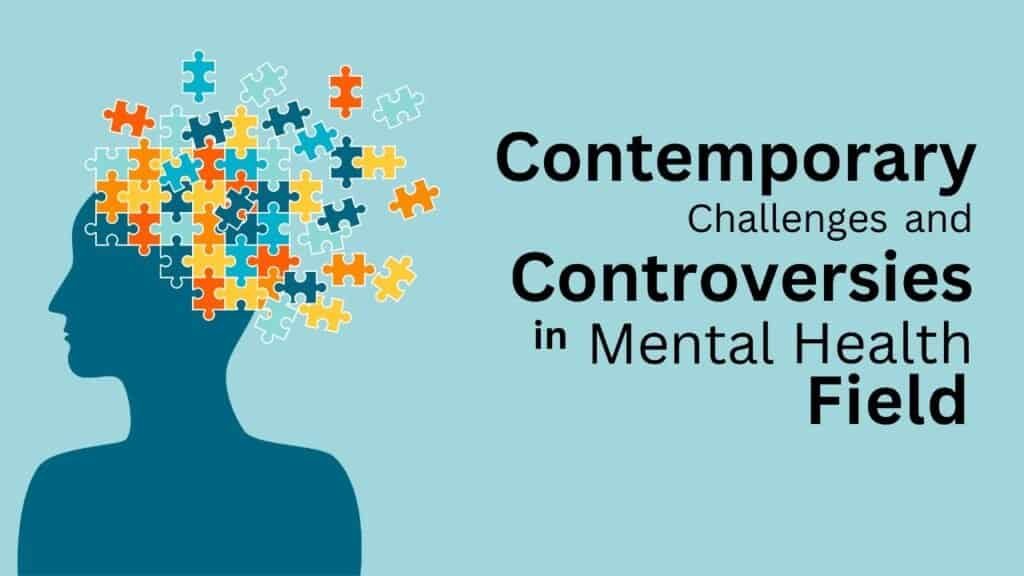
In the realm of mental health, the landscape is marked by a series of contemporary challenges and controversies that shape the way we perceive, diagnose, and treat mental health conditions.
Understanding these challenges is crucial for addressing the evolving needs of individuals seeking mental health support.
A. Diagnosis and Classification
- Complexity of Diagnosis: One of the primary challenges in contemporary mental health is the complexity of diagnosing mental health conditions.
Many disorders have overlapping symptoms, making it difficult to pinpoint the exact diagnosis. This can lead to misdiagnosis or delayed diagnosis, which can have significant consequences for individuals. - Dimensional vs. Categorical Models: There is ongoing debate about whether mental health disorders should be categorized into discrete diagnostic categories or treated more dimensionally.
Categorical models, like the DSM-5 (Diagnostic and Statistical Manual of Mental Disorders, Fifth Edition), provide clear criteria for specific diagnoses, but they may not capture the full spectrum of mental health experiences.
Dimensional models consider mental health on a continuum, which can be more inclusive but potentially less specific. - Overdiagnosis and Medicalization: There are concerns about the overdiagnosis and medicalization of common human experiences. Everyday emotions like sadness or stress can be pathologized, potentially leading to overprescription of medication and overtreatment, sometimes with negative consequences.
B. Treatment Approaches
- Efficacy and Individual Variation: The effectiveness of treatment approaches is a subject of ongoing debate. What works for one person may not work for another due to individual variation. The debate often centers around the effectiveness of psychotherapy vs. medication and whether a combination of both is more beneficial.
- Pharmaceutical Industry: There are concerns about the role of the pharmaceutical industry in influencing treatment decisions. Critics argue that the industry’s financial interests may prioritize the prescription of medication over alternative approaches, potentially overmedicating individuals.
- Stigma Surrounding Medication: The use of medication for mental health conditions is still stigmatized in some circles. This stigma can prevent individuals from seeking treatment that may be beneficial for them.
C. Access to Care
- Disparities in Access: Disparities in access to mental health care are a significant contemporary challenge. Many individuals, particularly in underserved communities, have limited access to mental health services, leading to unmet mental health needs and exacerbating health disparities.
- Insurance Coverage: The availability and adequacy of insurance coverage for mental health services are ongoing concerns. Some insurance plans provide limited coverage for mental health care, making it less accessible to those in need.
- Shortage of Mental Health Professionals: The shortage of mental health professionals, especially in rural and remote areas, is a barrier to accessing care.
The high demand for mental health services is not always met with an adequate supply of qualified professionals. - Digital Mental Health: The rise of digital mental health solutions presents opportunities and challenges. While teletherapy and mental health apps can expand access to care, they also raise concerns about data privacy, the quality of care, and potential overreliance on technology.
Understanding these contemporary challenges and controversies in the field of mental health is essential for shaping more effective, equitable, and patient-centered mental health care.
Ongoing research, advocacy, and policy changes aim to address these issues, striving for a future where mental health services are accessible, evidence-based, and free from stigma.
The Future of Mental Health Science

The future of mental health science holds great promise, with ongoing advancements in research and technology, as well as a growing emphasis on reducing stigma and increasing awareness.
This evolving landscape is set to transform how we understand, diagnose, and treat mental health conditions.
A. Advances in Research and Technology
- Neuroimaging and Biomarkers: As technology continues to advance, neuroimaging techniques are becoming increasingly sophisticated.
Researchers can now explore the brain’s structural and functional aspects in greater detail. The discovery of biomarkers related to specific mental health conditions is on the horizon, allowing for more precise diagnosis and treatment. - Genomics and Personalized Medicine: The field of genomics is revolutionizing mental health research. Researchers are identifying genetic markers associated with various mental health conditions.
This knowledge will pave the way for personalized treatment plans tailored to an individual’s genetic makeup. - Artificial Intelligence and Machine Learning: Artificial intelligence and machine learning are being harnessed to analyze vast datasets related to mental health.
These technologies can help predict risk factors, optimize treatment plans, and provide real-time monitoring for individuals dealing with mental health challenges. - Teletherapy and Digital Mental Health: The digital age has brought teletherapy and mental health apps to the forefront. These solutions are making mental health care more accessible and convenient.
As technology continues to improve, the quality and availability of digital mental health services are likely to expand. - Psychedelic-Assisted Therapy: Research into the therapeutic potential of psychedelic substances, such as psilocybin and MDMA, is gaining traction.
These substances, when used in controlled settings, show promise in treating conditions like depression, PTSD, and substance use disorders.
B. Reducing Stigma and Increasing Awareness
- Mental Health Education: Mental health education is becoming more prevalent in schools and workplaces. By fostering a better understanding of mental health from a young age, future generations are more likely to approach it with empathy and acceptance.
- Media Representation: The media is playing a significant role in reducing stigma by portraying mental health issues more accurately and empathetically in movies, TV shows, and news coverage. These portrayals help normalize conversations about mental health.
- Mental Health Advocacy: Advocacy efforts continue to gain momentum. Organizations, individuals with lived experiences, and mental health professionals are actively working to reduce stigma, promote mental health awareness, and lobby for policy changes that improve access to care.
- Global Mental Health Initiatives: The global community is increasingly recognizing the importance of mental health. Initiatives like the Sustainable Development Goals include mental health targets, and more countries are prioritizing mental health in their healthcare systems.
The future of mental health science is one of greater understanding, improved treatment options, and increased acceptance.
By harnessing the power of technology and research, while simultaneously working to reduce stigma and promote awareness, we are moving toward a world where mental health is valued as an integral part of overall well-being.
As we look ahead, the prospect of more precise diagnoses, tailored treatments, and accessible care gives hope to those dealing with mental health challenges.
The future of mental health science is marked by a commitment to better mental health for all, fostering resilience, recovery, and well-being for individuals and communities.
Introduction to the Science of Mental Health : Conclusion
In the complex tapestry of mental health, understanding, awareness, and scientific advancement are weaving a brighter and more compassionate future.
As we conclude this exploration of the science of mental health, it is essential to reflect on the key takeaways and the path forward.
- Holistic Understanding: We’ve discovered that mental health is a holistic state, embracing emotional, psychological, and social well-being. A balanced perspective recognizes that challenges are a part of life and that mental health exists on a spectrum.
- Significance of Mental Health: The significance of mental health goes beyond individual well-being. It extends to quality of life, societal cohesion, and economic prosperity. Acknowledging its importance is the first step toward building a healthier, more empathetic world.
- Historical Evolution: Delving into the historical context, we’ve seen how our understanding of mental health has evolved from superstition and stigmatization to a more humane and scientific approach. This history teaches us that progress is possible, and the reduction of stigma is achievable.
- Biological, Psychological, and Environmental Factors: The science behind mental health highlights that it is influenced by a complex interplay of biological, psychological, and environmental factors. These insights inform the development of holistic and effective treatment approaches.
- Contemporary Challenges and Controversies: We’ve seen that diagnosing mental health conditions is complex, treatment approaches vary, and disparities in access persist. Acknowledging these challenges is crucial for driving meaningful change and equity in mental health care.
- Future of Mental Health Science: The future of mental health science holds great promise. Advances in research, technology, and a growing emphasis on reducing stigma and increasing awareness are paving the way for more precise diagnoses, personalized treatment, and a world where mental health is a valued part of overall well-being.
In conclusion, understanding the science of mental health is not merely an academic pursuit. It is a journey of compassion and hope. By embracing this understanding, we can break down the barriers of stigma, foster acceptance, and create communities where individuals seeking support are met with empathy and evidence-based care.
The road ahead may be marked by challenges, but it is also illuminated by the promise of progress. Together, as individuals, communities, and societies, we can ensure that the science of mental health is not only understood but also actively applied to improve the lives of countless individuals, making mental well-being a fundamental cornerstone of a brighter, more inclusive future.
